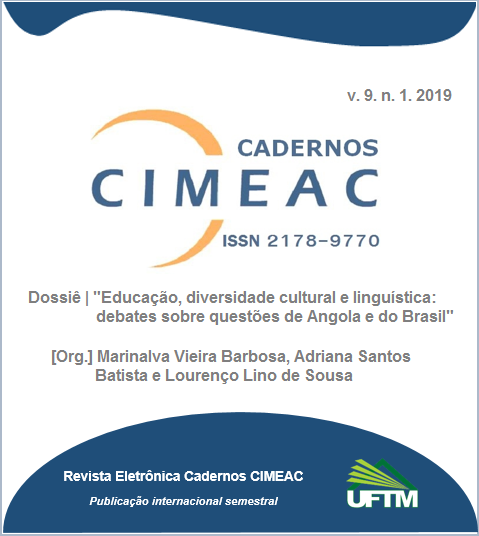Políticas de educação infantil e relações de gênero: implicações para a formação docente na perspectiva da diversidade e da diferença / Child education policies and gender relations...
DOI:
https://doi.org/10.18554/cimeac.v9i1.3860Abstract
Neste artigo, procuramos problematizar os modos pelos quais as discussões concernentes às relações de gênero tem sido ou não consideradas nas políticas de educação infantil e, a partir disso, procuramos tecer algumas possíveis implicações para a formação docente na perspectiva da diversidade e da diferença. Embora haja produção acadêmica significativa referente à formação de docentes para a educação infantil, são escassos os trabalhos que tem discutido as questões de gênero nas políticas de educação de crianças pequenas e na formação de educadores/as para as infâncias. Ao considerar a categoria gênero nas discussões concernentes às infâncias, é possível colocar em causa as tradicionais assertivas sobre o que é “natural”, no sentido do que é inato e instintivo para cada um dos sexos, como contribuição para a necessária desnaturalização das diferenças entre homens e mulheres, entre meninas e meninos, considerando as diferenças. Torna-se necessário reconhecer que a escola não é neutra e, portanto, as escolhas curriculares e/ou metodológicas, seja nas instituições ou nas políticas públicas, revelam os aspectos na construção da percepção de gênero que são reforçados, interditados ou rechaçados.
Palavras-chave: Educação infantil; Gênero; Políticas; Formação docente.
ABSTRACT: In this article, we seek to problematize the ways in which discussions concerning gender relations have been considered in child education policies and, from this, we try to weave some possible implications for teacher education in the perspective of diversity and difference. Although there is significant academic production related to the training of teachers for early childhood education, there are few studies that have discussed gender issues in policies for the education of young children and the training of educators for children. In considering the gender category in discussions concerning childhood, it is possible to call into question the traditional assertions about what is "natural" in the sense of what is innate and instinctive for each of the sexes, as a contribution to the necessary denaturalization of the differences between men and women, between girls and boys, considering the differences. It is necessary to recognize that the school is not neutral and therefore the curricular and / or methodological choices, whether in institutions or public policies, reveal the aspects in the construction of the perception of gender that are reinforced, interdicted or rejected.
Keywords: Early childhood education; Genre; Policies; Teacher training.
Downloads
Published
Issue
Section
License
Os autores que publicam nesta revista concordam com os seguintes termos:
(a) Não cobramos dos autores para a publicação neste periódico.
(b) Autores mantém os direitos autorais e concedem à revista o direito de primeira publicação, com o trabalho simultaneamente licenciado sob a Licença Creative Commons que permite o compartilhamento do trabalho com reconhecimento da autoria e publicação inicial nesta revista.
(c) Autores têm permissão e são estimulados a difundir e a distribuir a versão publicada de seu trabalho online (ex.: em repositórios institucionais ou na sua página pessoal) após o processo editorial, já que isso pode aumentar o impacto e a citação do trabalho publicado (Veja O Efeito do Acesso Livre).
* * *
AUTHORS COPYRIGHT AND PUBLISHING RIGHTS
Authors who publish with this journal agree to the following terms:
(a) This journal does not charge authors for publication.
(b) Authors retain copyright and grant the journal right of first publication with the work simultaneously licensed under a Creative Commons Attribution License that allows others to share the work with an acknowledgement of the work's authorship and initial publication in this journal.
(c) For authors whose articles have been accepted: authors are permitted and encouraged to post their work online (e.g., in institutional repositories or on their website) after the publication of the text in Cadernos CIMEAC, as it can lead to productive exchanges as well as earlier and greater citation of published work (See The Effect of Open Access).

 10.18554/cimeac
10.18554/cimeac

